#defund gender studies
Text
By: Amanda Borschel-Dan
Published: Oct 5, 2018
The term “Femi-Nazi” became all too accurate when a trio of academic tricksters participating in an elaborate hoax submitted portions of Adolf Hitler’s “Mein Kampf” rewritten through a feminist lens to a leading peer-reviewed feminist journal. The satirical paper was accepted this past academic year for publication by Affilia: Journal of Women and Social Work.
The sting operation against academic journals became public this week.
In a truncated year-long project aimed at highlighting the alleged influence of extremist dogma and confirmation bias in academia, the trio wrote 20 farcical “scholarly” papers — three of which were based on rewrites of “Mein Kampf” — for leading cultural studies journals. All 20 of the papers were based on “something absurd or deeply unethical, or both,” the authors have said; seven were accepted for publication.
One of the papers, “Our Struggle is My Struggle: Solidarity Feminism as an Intersectional Reply to Neoliberal and Choice,” was written under the alias Maria Gonzalez, PhD, who claimed to be based out of the fictitious Feminist Activist Collective for Truth (FACT).
According to the real-life authors, “The last two-thirds of this paper is based upon a rewriting of roughly 3,600 words of Chapter 12 of Volume 1 of ‘Mein Kampf,’ by Adolf Hitler, though it diverges significantly from the original. This chapter is the one in which Hitler lays out in a multi-point plan which we partially reproduced why the Nazi party is needed and what it requires of its members.”
youtube
Hailing from differing countries and fields, the trio of academics is made up of self-proclaimed liberals who claim to want to fix a broken system, not ban the fields of study themselves: Helen Pluckrose, a UK-based English literature and history scholar; James Lindsay, a math PhD; and Peter Boghossian, a professor of philosophy at Portland State University. The project was documented by Australian filmmaker Mike Nayna, who released a viral YouTube video with an authors statement on the project this week.
The scholars targeted high-ranking humanities journals in the niche subjects they label as “grievance studies.” These relatively new fields, which have become popular in the past 50 years with the rise of the civil and women’s rights movements, examine the lives of the historically and traditionally oppressed: women, racial, religious and cultural minorities, and the LGBT community.
With a steep learning curve, the team quickly took six of their initial attempted hoax papers out of circulation, believing they could do better. After adapting their submissions based on peer reviewers’ comments, within a few months, an unheard of seven absurd papers were accepted. Leading the pack was “research” on rape culture at urban dog parks, which was recognized by leading peer-reviewed feminist geography journal Gender, Place, and Culture as “exemplary scholarship.”
It was skeptical media attention after the publication of the dog parks paper which brought the project, initially scheduled for 18 months, to an abrupt end this summer. All papers are available online, as well as the name-redacted comments of the peer reviewers.
According to the trio of scholars, it is likely that another six fictitious papers would have been accepted for publication as their experiment in “reflexive ethnography” within the world of grievance studies progressed.
Is there any idea so outlandish that it won't be published in a Critical/PoMo/Identity/"Theory" journal? Helen Plucrose et al. submitted a dozen hoax papers to find out. https://t.co/TTDLuIQN9p via @areomagazine
— Steven Pinker (@sapinker) October 3, 2018
The trio contends that the fields have been infiltrated by radical and intolerant theories. And what better way to prove their point, they figured, than turning to one of the most extreme manifestos in recent history — “Mein Kampf.”
Mathematician Lindsay told The Times of Israel on Thursday, “We decided to try to rewrite something from something old and nasty, and ‘Mein Kampf’ not only is the pinnacle document, it proved accessible for our methods.”
Theological fire and brimstone writing “didn’t transliterate easily,” Lindsay said. However, “much of ‘Mein Kampf’ is an autoethnography.” This style of self-reflective writing is en vogue in the grievance studies’ academic journals and therefore the substitution of feminist or anti-patriarchal terminology for Hitler’s well-known screed was evidently undetectable to the peer reviewers.
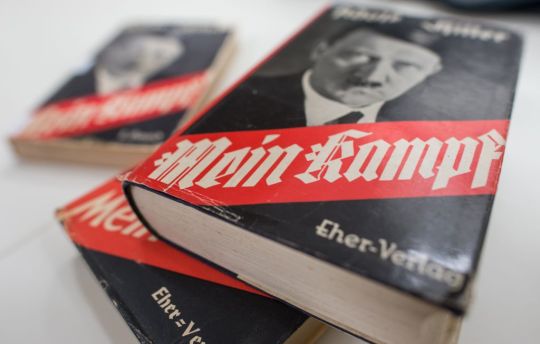
According to a comment from the co-editor of the journal, the reviewers were “supportive of the work and noted its potential to generate important dialogue for social workers and feminist scholars.”
A quest to expose ‘sophistry’
In a long co-bylined essay published Tuesday in Aero Magazine, which Pluckrose edits, the trio wrote that during the course of their experiment, “the reviewers’ comments are in many ways more revealing about the state of these fields than the acceptances themselves.”
The team explained their motivations and methodology: “We set out with three basic rules: (1) we’ll focus almost exclusively upon ranked peer-reviewed journals in the field, the higher the better and at the top of their subdisciplines whenever possible; (2) we will not pay to publish any paper; and (3) if we are asked at any point by a journal editor or reviewer (but not a journalist!) if any paper we wrote is an attempted hoax, we will admit it.”
The basis of each paper was “something absurd or deeply unethical (or both) that we wanted to forward or conclude. We then made the existing peer-reviewed literature do our bidding in the attempt to get published in the academic canon,” they wrote.

[ Perpetrators of an elaborate hoax against academic journals (from left) mathematics Ph.D. James Lindsay, UK academic Helen Pluckrose and philosophy professor Peter Boghossian. (courtesy) ]
“This is the primary point of the project: What we just described is not knowledge production; it’s sophistry. That is, it’s a forgery of knowledge that should not be mistaken for the real thing. The biggest difference between us and the scholarship we are studying by emulation is that we know we made things up,” they wrote.
In undertaking the hoax, the use of satire was often employed. According to the authors, every paper “also endeavored to be humorous in at least some small way (and often, big ones).”
The team was so successful that four journals asked the papers’ fictitious authors to become peer reviewers themselves. For “ethical reasons,” they declined.
The proverbial wheels came off after a Twitter account called “New Real Peer Review” sniffed something foul from the Dog Park essay. Soon, local newspapers became suspicious, and eventually, in cooperation with the hoax team, the Wall Street Journal broke the story this week, with an ever-widening international ripple effect and coverage.
Satire as social commentary
It is not the first time scholars have written hoax papers to illustrate a broken academia. While other fields can be equally guilty of publishing unscientific work, gender studies in particular has already been repeatedly flagged as problematic.
After the current hoax experiment became public this week, author and Harvard lecturer Yascha Mounk proclaimed on Twitter that “Three intrepid academics just perpetrated a giant version of the Sokal Hoax… Call it Sokal Squared. The result is hilarious and delightful. It also showcases a serious problem with big parts of academia.”
In 1996, mathematics and physics Prof. Alan David Sokal submitted a nonsensical paper to Duke University’s Social Text journal called “Transgressing the Boundaries: Toward a Transformative Hermeneutics of Quantum Gravity,” in a (successful) experiment illustrating editorial bias and the prevalent incorrect use of scientific terms.
The Sokal hoax was the basis for a May 2017 experiment when two of the current project’s authors, Boghossian and Lindsay, attempted to replicate his success with the publication of a fake paper that claims “that penises conceptually cause climate change.” They write about the experiment in an essay, “The Conceptual Penis as a Social Construct: A Sokal-Style Hoax on Gender Studies,” which discusses the problematic nature of “pay-to-publish” open access journals.
In September 2017 the duo became a trio with the addition of Pluckrose and the new, much more elaborate project was launched.
According to the scholars, the goal of the current project was not to end the study of these niche academic disciplines, rather highlight the intolerant thinking within their lock-step that is infiltrating popular culture.
Asked by The Times of Israel if academic journals in the field of Jewish Studies would also be in their sights, Lindsay answered that the team didn’t fully examine this particular field. “The grievance studies methods are dubious, and I hope [Jewish Studies scholars] don’t take them up,” he said.
“I’ve only looked closely at one paper in Jewish Studies and it seemed to use similar methods but criticized a nasty streak of antisemitism in critical race scholarship,” he wrote via Twitter, citing a paper called, “Critical Whiteness Studies and the ‘Jewish Problem.'”
The cited paper was written in response to the increasingly trendy theory proposed by Critical Whiteness Studies and promoted by young American Jews on college campuses, social media, and even mainstream Jewish media, that Jews are not “white.”
According to the paper’s abstract, “‘whiteness” is used as a critical concept denoting those who enjoy white privilege in American and other Western societies.” Calling a Jew “white,” however, “is more than controversial, for it assimilates the most persecuted minority in European history to the dominant majority, while downgrading the significance of antisemitism.”
The fact that this type of topic itself is being debated within the ivory tower and infiltrating popular culture is not what appears to bother the scholars. Rather, it is the fact that there are few skeptical and critical checks within peer-reviewed journals and that what they consider to be a “kind of blatant corruption” through confirmation bias is pervasive in the fields.
“Politically biased research that rests on highly questionable premises gets legitimized as though it is verifiable knowledge. It then goes on to permeate our culture because professors, activists, and others cite and teach this ever-growing body of ideologically skewed and fallacious scholarship,” writes the team.
“We managed to get seven shoddy, absurd, unethical and politically biased papers into respectable journals in the fields of grievance studies. Does this show that academia is corrupt? Absolutely not. Does it show that all scholars and reviewers in humanities fields which study gender, race, sexuality and weight are corrupt? No,” they write.
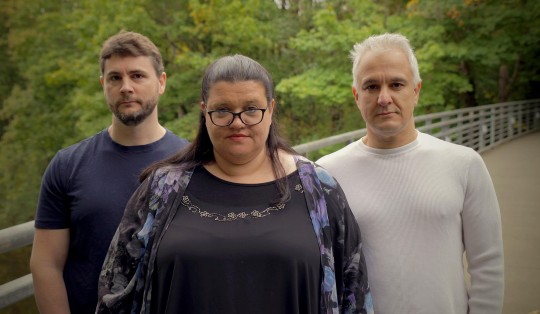
[ Perpetrators of an elaborate hoax against academic journals (from left) mathematics Ph.D. James Lindsay, UK academic Helen Pluckrose and philosophy professor Peter Boghossian. (courtesy) ]
However, when a journal publishes — without revisions — a paper written in under six hours by a man which describes “moon meetings” for women in womb rooms with vulva shrines, it might reasonably be thought that something is deeply amiss. When an essay which promotes the pedagogical boon of silencing and chaining “privileged” pupils to the floor to affect “experiential reparations” is taken under serious consideration and given notes for improvement, one might wonder about the Ivory Tower’s foundations.
The authors are now calling upon universities to conduct a thorough review of the grievance study fields “to separate knowledge-producing disciplines and scholars from those generating constructivist sophistry.”
“Research into these areas is crucial, and it must be rigorously conducted and minimize ideological influences,” they write. “The further results on these topics diverge from reality, the greater chance they will hurt those their scholarship is intended to help.”
--


==
Flashback to the days when this was shocking and hard to believe, rather than ordinary and everyday.
#Grievance Studies#sophistry#Peter Boghossian#Helen Pluckrose#James Lindsay#academic corruption#corruption of education#academic fraud#defund gender studies#woke#wokeness#cult of woke#wokeism#wokeness as religion
14 notes
·
View notes
Text

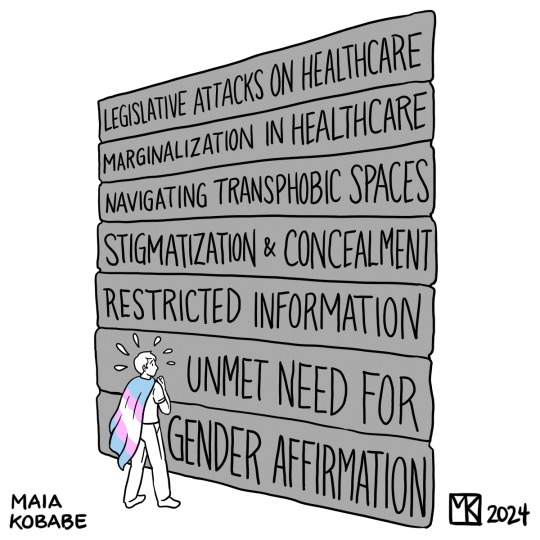

Transphobia Makes Chest Binding More Dangerous
Chest binding, or wearing anything to flatten the chest in order to appear masculine or androgynous, is one of many ways that transmasculine and nonbinary people can affirm their gender identity and harmonize their physical presentation with their sense of self. Some people bind in order to “pass” as male at times when being visibly transgender could be dangerous. Others bind for the mental health benefits, documented across multiple studies, of being able to move through the world feeling at home in an authentic identity. But despite these life-changing benefits, anti-trans activists focus on the risks of binding, such as shortness of breath, skin abrasions, or shoulder pain, and seek to restrict the practice.
(read the rest of the article below the cut or here online)
Binding scares anti-trans activists because of its accessibility. Unlike hormones, binding requires no prescription; unlike state-ID changes, it requires no paperwork. Binding is often one of the first ways that trans and nonbinary youth who are assigned female at birth can flexibly, reversibly—sometimes quietly under their clothes and unbeknownst to anyone else—“try on” a new gender identity to see how it feels. This accessibility makes binding terrifying to those who want to eradicate trans people from public life. Their usual tricks are powerless to stop binding: there is no teacher they can gag, no librarian they can defund, no doctor they can criminalize to stop people from binding. Unless anti-trans zealots are willing to ban sports bras, bandages, tape, shapewear, or even swimsuits and tight shirts, there is no way to render binding completely inaccessible.
It is no surprise then that anti-trans activists hyperfocus on the health risks of binding, often misrepresenting studies on binding to inflate the physical risks of binding and ignoring the sometimes life-saving mental health benefits. We know because one of us (Sarah Peitzmeier) conducted most of those studies. Tired of seeing statistics from these research studies ripped out of context and weaponized against the very communities who participated in and supported the research, we began to discuss turning the findings from these studies into a book. Breathe: Journeys To Healthy Binding, is a resource for those who have questions and concerns about binding, and for those who already bind and want to do so in ways that maximize the mental health benefits and minimize the physical risk. We want to help people bind in ways that are affirming, yet gentle on the body.
Anti-trans activists who claim to be “protecting” people from the harms of binding by trying to restrict binding specifically and trans people more generally are in fact making binding more dangerous. In our research and lived experience, here are six ways we have seen transphobia make binding far more dangerous than it should be for trans and gender diverse people.
Legislative attacks on medically necessary healthcare
Binding is the only option left to mitigate chest dysphoria in states where best-practice medical care has been banned. Anti-trans bills blocking medical or surgical affirming care for trans youth have been passed in 24 states, with politicians inserting themselves between patients, families, and their doctors. Trans youth who go through puberty early without access to puberty blockers may have to manage severe chest dysphoria for a decade before they are even legally allowed to pursue top surgery, assuming they have the financial resources to access it. We know that receiving puberty blockers, compared to wanting puberty blockers but being unable to access them, is associated with 70% lower lifetime odds of suicidal ideation – so this is lifesaving care. It seems particularly cruel, then, for the same people who advocated for these laws denying healthcare to also attack binding. If anti-trans activists truly cared about the potential risks of binding for trans youth, they would not simultaneously advocate for bans on medically necessary care.
Marginalization in healthcare
Trans patients who do experience injuries or health issues from binding often don’t have access to knowledgeable and compassionate treatment. Even trans-affirming providers generally receive no training in how to counsel patients to reduce their risk around binding, as medical and nursing schools typically see trans-specific topics like binding as “specialty” topics. At worst, providers may be actively prejudiced against trans people. Laws against providing gender-affirming care in 24 states can be interpreted broadly and scare providers from offering any kind of care to trans adolescents or even adults. Binding-related medical issues are thus left to worsen without quality clinical care.
Binding can be necessary to navigate transphobic spaces
Being visibly trans can expose people to discrimination, and binding is sometimes the only way to safely move through a hostile world. It is still legal to discriminate against trans people in employment or housing in 30 states, and trans people are banned from using the restroom that matches their gender in 10 states. Some trans people may present as otherwise masculine but for the appearance of their unbound chest, which would “out” them as transgender. Until we live in a world where people can safely express a range of gender presentations without living in fear of assault or discrimination, binding is essentially the only option for many transmasculine people who need to “pass” for their own safety. These people may also have to keep binding for safety reasons regardless of any symptoms they may develop.
Concealing binding due to stigma increases the risks
The health risks from binding are increased by the need to conceal it. For instance, teens who are trying to conceal their binder from their parents often have trouble washing their binder regularly without their parents seeing it in the laundry. As a result, the dirt and sweat buildup on their unwashed binder predisposes them to skin complications. Without parental support, many teens cannot purchase a binder, which is typically ordered online with a credit card. Some of these teens resort to using ACE bandages, which are more readily available but far more dangerous because they are designed to compress inflammation. One 2020 study by researchers and clinicians at the Children’s Hospital of Los Angeles found that teens with parents who opposed binding were almost twice as likely to have used ACE bandages to bind their chests. Teens with supportive parents had access to safer options.
Restricted access to information on safer binding that does exist
Because discussing gender identity is banned or restricted in schools in 14 states, trans and nonbinary people often struggle to access information about trans-specific issues such as binding. We have a growing evidence base and clinical expertise around how to reduce risk associated with binding—including taking one day off from binding each week, avoiding use of ACE bandages, and stretching muscles and ligaments that may be constricted by binding—but in an era of book bans and gag rules, many trans people have no way to learn these important tips. Instead, they may assume that binding is inherently painful and this is just the price they have to pay, which is unequivocally not true. We now know there are so many ways to make binding safer.
Unmet need for gender affirmation
When there is a gap between how people fundamentally see themselves and how the world sees them, they are more likely to engage in risky (but identity-affirming) behaviors to help close that gap. When trans people are chronically misgendered at work or school and are banned from medically affirming their gender, binding may be one of the only tools they have to affirm their gender. They will be more likely to ignore signs that their body is struggling with the side effects of binding, as they have nothing else to affirm them. Combine this with lack of information about how to bind more safely and lack of healthcare to address problems that emerge, and people can end up with serious binding-related symptoms.
Forty percent of trans adults in the U.S. have attempted suicide at some point in their lives. Binding can help people imagine a future for themselves that feels worth living. As one of our research participants said, “Binding gave me the freedom to exist.”
Many people successfully bind with minimal physical side effects even in today’s world. If every trans person who wanted to bind could do so with a properly fitting binder, while living day to day without fear violence for being visibly trans, all while having access to knowledgeable and affirming medical care (including puberty blockers or top surgery as desired and appropriate), binding could become safer for everyone.
It’s on all of us to create that world. We call on everyone to fight back against anti-trans legislation, disrupt anti-trans hostility, and to support the trans youth and adults in our communities as they become their most authentic selves.
By Maia Kobabe and Dr. Sarah Peitzmeier
May 8, 2024 7:00 AM EDT
Kobabe (e/eir/em) is author of the award-winning and bestselling memoir Gender Queer, the most challenged book in America for the last three years. Peitzmeier Ph.D., MSPH (she/her) is a social epidemiologist and assistant professor in the Department of Health Behavior and Biological Sciences at the University of Michigan. Kobabe and Peitzmeier are the authors of BREATHE: JOURNEYS TO HEALTHY BINDING, a graphic guide to chest binding with real-life stories and research-backed advice.
206 notes
·
View notes
Text
TW: Trans activists
For more than a decade now, trans activists have been harassing those who belong to a feminist philosphy we call radical feminism or the women’s liberation movement.
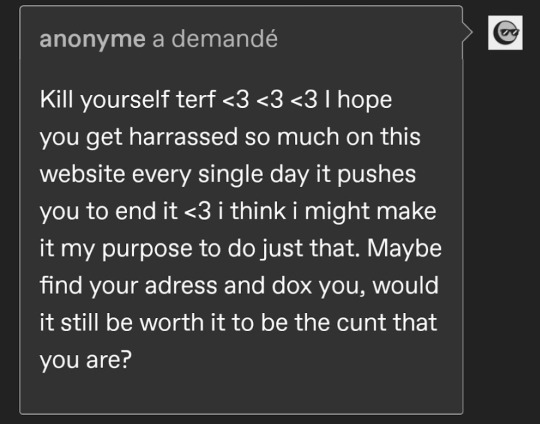
Radical feminists, like most feminists, believe that men use sex to oppress women. Meaning they oppress women through sexual exploitation and by perpetuating sexist discrimination towards those who belong to the female sex. They were the first to research and expose violence against women as endemic and traumatizing, and to create shelters for rape and domestic violence victims. Those shelters are now being vandalized and defunded by trans activists.
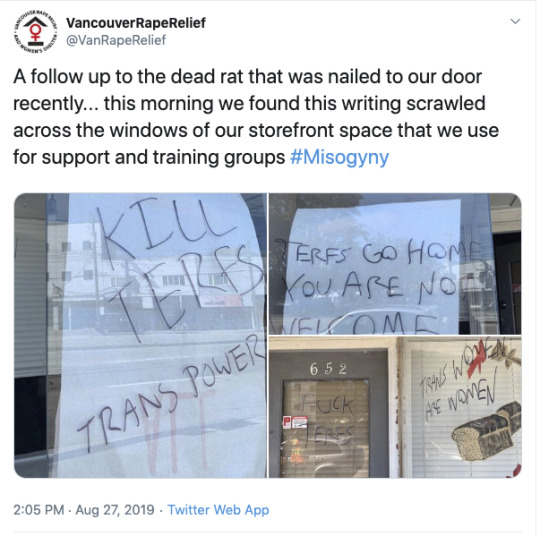
Because radical feminists don’t believe in gender identities, gendered souls, gender roles or any form of innate personality based on sexist stereotypes, they have been receiving rape and death threats on a daily basis. The acronym “terf” was soon invented and is now used to describe any person who doesn’t support the trans movement, even if they’re not feminists, just as long as they're women, though lesbians and feminists tend to be the primary targets.

As a whole, the trans movement claims that its biggest enemy and threat, its most pressing matter, its most dangerous opponent is the women’s liberation movement or what they call “radfems” or “terfs”. This is where their energy and anger is directed, typically in the form of sexist and sexual harassment, intimidation techniques, violence, censorship and social isolation. So let’s talk about that.
From the book Hate Crimes in Cyberspace:
Cyber harassment involves threats of violence, privacy invasions, reputation-harming lies, calls for strangers to physically harm victims, and technological attacks.


Victims’ in-boxes are inundated with threatening e-mails. Their employers receive anonymous e-mails accusing them of misdeeds. Even if some abuse is taken down from a site, it quickly reappears on others. Victims’ sites are forced offline with distributed-denial-of-service attacks.

While some attackers confine abuse to networked technologies, others use all available tools to harass victims, including real-space contact. Offline harassment or stalking often includes abusive phone calls, vandalism, threatening mail, and physical assault.

The Internet extends the life of destructive posts. Harassing letters are eventually thrown away, and memories fade in time. The web, however, can make it impossible to forget about malicious posts. And posts that go viral attract hundreds of thousands of readers.
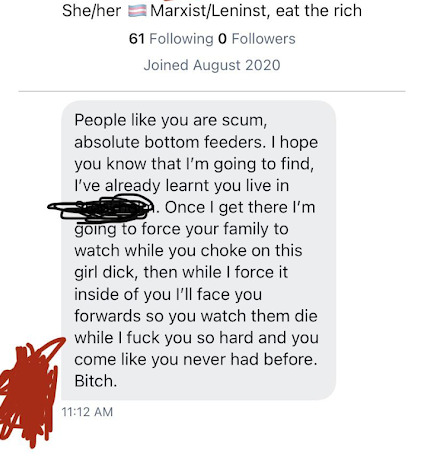
Online harassment can quickly become a team sport, with posters trying to outdo each other. Posters compete to be the most offensive, the most abusive. An accurate name for such online groups is cyber mobs. The term captures both the destructive potential of online groups and the shaming dynamic at the heart of the abuse.

Cyber harassment disproportionately impacts women. The U.S. National Violence Against Women Survey reports that 60 percent of cyber stalking victims are women, and the National Center for Victims of Crimes estimates that the rate is 70 percent. Of the 3,393 individuals reporting cyber harass-ment to WHOA from 2000 to 2011, 72.5 percent were female. The most recent Bureau of Justice Statistics report found that 74 percent of individuals who were stalked on or offline were female, and 26 percent were male.

Researchers found that users with female names received on average one hundred “malicious private messages,” which the study defined as “sexually explicit or threatening language,” for every four received by male users.

According to the study, “Male human users specifically targeted female users.” By contrast, men are more often attacked for their ideas and actions. John Scalzi, a science fiction author and popular blogger, has found online invective typically situational. When he writes something that annoys people, they tell him so. People do not make a “hobby” out of attacking his appearance and existence as they do female bloggers.
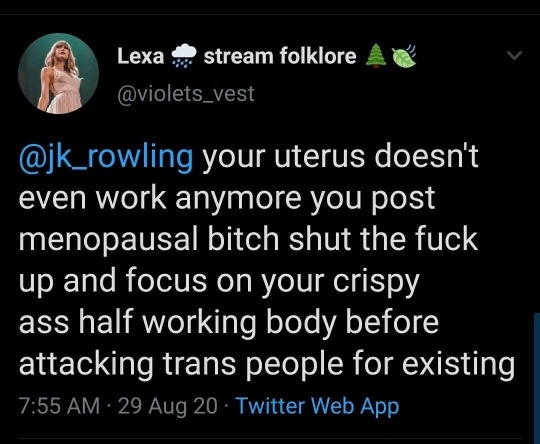
The nature of the attacks similarly attests to bigotry’s presence. Hate expresses something uniquely damaging. It labels members of a group as inhuman “others” who do not possess equal worth. It says that group members are inferior and damaged. Bigotry conveys the message that group members are objects that can be destroyed because they have no shared humanity to consider.
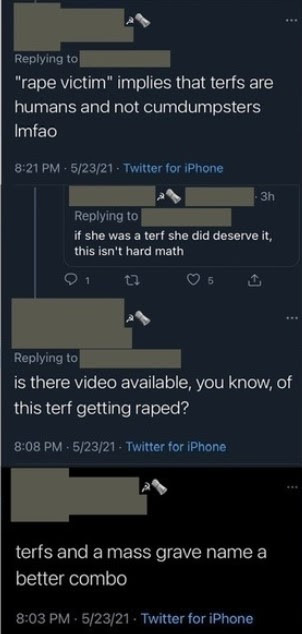
Cyber harassment exploits these features by exposing victims’ sexuality in humiliating ways. Victims are equated with their sexual organs, often described as diseased.


Once cyber harassment victims are sexually exposed, posters penetrate them virtually with messages that say “I will fuck your ass to death you filthy fucking whore, your only worth on this planet is as a warm hole to stick my cock in.”
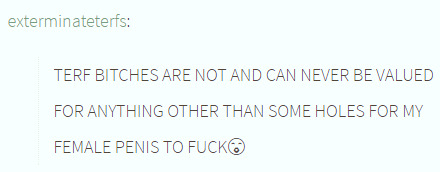

Rape threats profoundly impact women: over 86 percent of rape victims are female. Virtual elimination may follow the imagined penetration: “First I’ll rape you, then I’ll kill you.”


One woman who faced online abuse noted, “Someone who writes ‘You’re just a cunt’ is not trying to convince me of anything but my own worthlessness.”
Despite the gravity of their predicaments, cyber harassment victims are often told that nothing can or should be done about online abuse. Journalists, bloggers, lay observers, and law enforcement officials urge them to ignore it. Victims are called “whiny baby girl[s]” who are overreacting to “a few text messages.” Often victims are blamed for the abuse. They are scolded for sharing their nude images with loved ones or for blogging about controversial topics. They are told that they could have avoided the abuse had they been more careful.

A related message sent to victims is that the benefits of online opportunities are available only to those who are willing to face the Internet’s risks. They are advised not to expect anything different if they want to make a name for themselves online. The choice is theirs: they can toughen up or go offline.
The Internet is governed by society’s rules. Life online bleeds into life offline and vice versa. The notion that more aggression should be tolerated in cyberspace than in real space presumes that virtual spaces are cordoned off from physical ones.
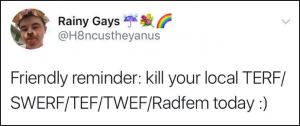
Most victims do not report cyber harassment to the police because they assume that nothing will be done about it. Sadly, they are right. Law enforcement frequently fails to act on victims’ complaints even though criminal law would punish some of the behavior. Victims are told to turn off their computers because “boys will be boys.”
Online harassment victims are told that nothing can be done; they are advised to ignore rape and death threats. During the
summer of 2013, high-profile women were subjected to a torrent of online threats. The feminist activist Caroline Criado Perez received hundreds of graphic rape threats via Twitter after her successful campaign to feature more female images on British banknotes.

Members of Parliament and female writers who publicly supported Criado-Perez faced the same, including bomb threats. One tweet featured a picture of a masked man holding a knife with the message, “I’m gonna be the first thing u see when u wake up.”

Because the Internet serves as people’s workspaces, professional networks, résumés, social clubs, and zones of public conversation, it deserves the same protection as offline speech. No more, no less.
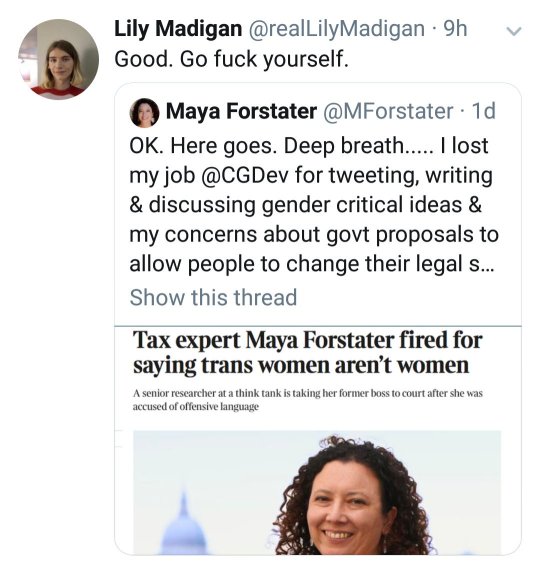
Without doubt, the free speech interests at stake are weighty. Free expression is crucial to our ability to govern ourselves, to express our thoughts, and to discover truths. For that reason, government cannot censor ideas because society finds them offensive. Truthful speech must not be banned just because it makes people uncomfortable.

But credible threats, certain defamatory falsehoods, social security numbers, and nude images posted without consent contribute little to discourse essential for citizens to govern themselves and discover truths. Their net effect is the silencing of victims. Victims could blog, post videos, and engage on social networks without fear of destructive cyber harassment. They could raise money using networked tools unencumbered by rape threats, reputation-harming lies, and distributed- denial- of- service attacks. They could take advantage of all of the expressive opportunities available online. Protecting against online harassment would secure the necessary preconditions for victims’ free expression.

With the help of law and the voluntary efforts of Internet intermediaries, parents, and teachers, we might someday achieve a free and equal Internet. We need to take action before cyber harassment becomes a normal feature of online interactions. A hostile online environment is neither inevitable nor desirable. We should not squander this chance to combat discriminatory online abuse; it is early enough in our use of networked tools to introduce equality of opportunity as a baseline norm of interaction.

266 notes
·
View notes
Text
Uncertain Future of the Historic Kinsey Institute

For 75 years, the Kinsey Institute was an integral part of the University of Indiana, famous the world over for their study of human sexuality. …
It should come as a shock to no one that the vote comes after state lawmakers blocked public funding for the institute. The Kinsey Institute has long been a target for conservative culture warriors, even going back to the organization’s founding in the 1940s. The Kinsey Institute and the research of its founder, Alfred Kinsey, revolutionized the academic fields of sexology and human sexuality, topics that are still considered taboo.
However, the threat of defunding turned into a reality earlier this year after freshman Republican lawmaker Lorissa Sweet rammed through an amendment cutting any state funds from going to the institute. Sweet repeated baseless conspiracy theories that Kinsey researched have been conducting sexual experiments on children. Sweet has continued to falsely accuse the Institute of harboring child predators, a new tactic of the alt-right to demonize the LGBTQ+ community and their allies. …
#kinsey institute#alfred kinsey#sex research#gender#sexuality#queer#queer history#lgbqti#lgbt#lgbtq#republicans#right wing#christian nationalism#lorissa sweet#2020s#2023
9 notes
·
View notes
Text
[“In alarmingly titled studies such as Expensive Children in Poor Families: The Intersection of Childhood Disabilities and Welfare, sociologists lay out the costs of disabled children for poor women in our privatized culture of care: “Between 20 and 25 percent of the families [on welfare] had a disabled or ill mother or child, 10 to 12 percent had a disabled child, and 3 to 5 percent cared for children with severe limitations.” According to this study, work was directly affected by a child’s disability: “Families with disabled children also incurred indirect costs in the form of forgone earnings. Mothers with more than one moderately disabled child or with at least one severely disabled child were 20 to 30 percent less likely to have worked in the previous month than mothers with healthier children.” The study notes how racialized this all is: the vast majority—over 90 percent—of the study’s subjects were BIPOC. But rather than indict the system that leads to these inequities, the disabled children are blamed, accused of being expensive.
It’s also remarkable that the gendering of the caregiver as a woman—”mothers”—is assumed here. Nowhere does the study ask why mothers are expected to supply these care needs—why the state and local government do not provide this care or why fathers or other kin are not expected to be primary caretakers of their high-needs disabled children. Privatization and feminization are assumed. The mother is tasked with putting her child’s care in competition with her ability to make a living. Her experience of caregiving is figured only as a loss: of income, of work. That caregiving a loved one could be more rewarding than repetitive minimum-wage labor is not questioned. Of course the public costs of this system are the point of the study, but the gendered, private informal care system is never interrogated. Disability is the problem here!
The family—also known as the mother—is expected to provide care for disabled people at all stages of the life cycle. The blunt, gendered facts are startling: Women make up 75 percent of all family caregivers. For the working poor, this returns mothers to the public welfare systems that have been systematically defunded since the 1980s—and to low-paying care work that extracts care for others while rendering them unable to care for their own families. Grace Chang analyzes the consequences of this extractive, racist neoliberal system for the immigrant women who provide this care. “Ironically,” she notes, “these women’s labor—caring for the young, elderly, and the disabled—makes possible the maintenance and reproduction of the American labor force at virtually no cost to the U.S. government. At the same time, this labor is extracted in such a way as to make immigrant women’s sustenance of their own families nearly impossible.”It is horrifically ironic that care workers are rendered unable to care for their own families in this exploitative system.”]
jennifer natalya fink, from all our families: disability lineage and the future of kinship, 2022
61 notes
·
View notes
Note
Sorry to bother! Do you have any readily available link to your most thorough discussion/defense for defund the humanities (esp. why exclude History/Philosophy)?
I don't remember if I've ever laid out a systematic thesis or anything but the short summary of my position is that pretty much every other humanities discipline is either a sloppy/unrigorous form of history or a sloppy/unrigorous form of philosophy, and whatever it claims to study would be better done reorganized under one of those two banners.
For any academic discipline, if we're going to say that our society should expend resources teaching it to students, we should be able to justify why we're doing so. I believe that history and philosophy have generally been around and taught in an academic setting for long enough to prove their own usefulness and value to humanity, and at least that they can be taught coherently and reliably to students. The hard sciences have clearly also done so, especially more recently in the past two centuries.
But most of these other disciplines aren't even that old, and I think they've never successfully made the case that they should exist at all. Something like gender studies or cultural theory or literary criticism that doesn't have a thorough grounding in philosophy is basically just a cheap imitation of philosophy, with such poor conceptual analysis it has no chance of producing anything coherent.
I also think that so-called "continental" philosophy, especially in the 20th century, along with all the spinoff disciplines such as sociology, anthropology, etc. have gotten so caught up in political posturing that they've become irredeemably ungrounded from reality, and so they should be forcibly euthanized (the disciplines, not the practitioners). Hegel had something of value to say, as did Nietzsche, but I'm thoroughly unconvinced that Derrida or Foucault did. I don't find that what passes under the banner of "Social" or "Political" philosophy really counts for much either, in my view it's sort of just not philosophy at all if it isn't grounded in logic and metaphysics.
tl;dr: All those other disciplines lack rigor and coherence, and instead substitute in sloppy polemicism.
6 notes
·
View notes
Text
Right wingers: college degrees are useless! Infact! college just brainwashes you into being a Cultural Marxist!
Memphis police department: *lower standards for hiring into not needing any sort of college degree from their officers*
Right wingers: SEE THIS IS DEFUNDING AT WORK! IF THE 5 OFFICERS HAD A DEGREE IN ANTHROPOLOGY AND GENDER STUDIES NONE IF THIS WOULD HAVE HAPPENED!
4 notes
·
View notes
Text
Vintage Faith: The Present Remnant
In Romans 11, Paul paints the picture of our faith as a tree that was planted with God’s promise to Abraham. This tree, rooted in the patriarchs, grew forth as the nation of Israel and brought us the Scriptures and Jesus Christ. The analogy is that Gentiles were grafted into this giant towering tree of the Jewish faith, and they quickly became a giant and fruitful branch. In the early church, most Christians were Jews. By the end of the first century, most Christians were Gentiles. This explains why books of the New Testament were written, as the Gentile Christians had many questions about sexual morality (1–2 Corinthians) and circumcision (Galatians), among other issues. These were matters settled among Jewish believers, but the new Gentiles brought a lot of new questions.
Throughout Romans, Paul emphasizes a relationship with God through faith in Jesus Christ. But what happens when people start to take God for granted? What happens when they are no longer appreciative of His presence and provision? Some people develop a sense of entitlement for all the blessings God gives. This mindset can affect anyone, so we must be careful to fight against it.
A great threat to the gospel of Jesus Christ today is critical theory. Overtaking almost all academic disciplines, critical theory seeks to dismantle, disregard, and destroy what has been built. It is the opposite of traditional theory, which is how to build a relationship with God, family, marriage, business, economy, community, and nation. In gender studies, critical theory leads to transgenderism. In civics, it leads to defunding the police. In economics, it leads to socialism. It also leads to atheism.
Critical theory is so powerful and prevalent because demonic forces are behind it. In Revelation 12:10, Satan is called the accuser of God’s children. The original Greek word for accuser can also mean ‘the critic.’ Critical theory is criticism. It’s easier to criticize people who are doing things than to do something. It’s easier to criticize what has been built and to tear it down than to build something better. The result is a culture of criticism, judgment, entitlement, and self-righteousness. In the church, critical theory leads to apostasy because people who profess to be Christians start criticizing and deconstructing the Bible and even God Himself. To keep ourselves from this spirit of apostasy, we must cultivate an attitude of gratitude. We must honestly ask ourselves, What would life be like if God was not involved? What if He never said or did anything in the history of the world? Would my life be better? The answer is a firm and resounding “No!”
Today’s Reflection
How is your life better because God is in it?
0 notes
Text
Don't care if this is controversial, but STEM majors who sincerely believe that arts and humanities are unimportant are mind-numbingly stupid, and most likely are not as good at their area of "expertise" as they'd like to believe.
They fail to understand that things that scientists invent and discover are inherently tied to the language and culture they're from. The native language a person speaks determines their patterns of thinking, what things they detect and understand; their lived experiences, socio-economic background, culture etc. narrow their interests.
Let me demonstrate on the differences between my native language, Serbo-Croatian, and English. Serbo-Croatian has fewer tenses than English(7), but more importantly, even if we have several past tenses, they are ALL strictly tied to the past. We have a strict linear percetion of time, where the past, present and future cannot be intermixed and go hand-in-hand: they are strictly separated. This isn't a problem in English, because of the Perfect Aspect: it forms relational tenses that express the coexistence of a past moment and a moment that it relates to. Conversely, English has only two cases (if you count the 's form as a genitive), and no grammatical genders, while Serbo-Croatian has 7 grammatical cases and three grammatical genders (male, female, and neuter; English only has these in the form of pronouns, but it does not affect the form of nouns). As one can notice, English is a language that is very time and process oriented, while Serbo-Croatian (and most Slavic languages) is very material and structure oriented. I will talk about science shortly, but one can clearly see this in the art produced by the English speaking world-time and its passage is one, if not the greatest concern or English and American art.
This reflects in the works of science as well-gravity, space and their connection to time are some of the greatest scientific problems that (for the most part) western scientists have concerned themselves with for the last 100 years (aside from the problem of light, but again it also has a connection to the Americans' obsession with time. I would like someone better acquainted with the topic to write on this)-this problem is at the core of their science. Compare this with Tesla, a truly brilliant mind-while he was interested in processes, he was mostly concerned with their implementation and their use-he was an inventor, primarily. This is a clear extension of how language impacts what people percieve as important and deem worthy od study.
Not to mention that language is the primary and only source for a scientist to express their ideas (math is a form of language as well, speaking of its function, as it's purpose is to express ideas-it is just a shorthand for spoken language). Without it, their whole field of study would not exist-no way of channeling their thoughts would exist, and they would be incapable of thinking about such things in the first place.
Why would someone, in their right mind, want to defund and ridicule the study of langauges and various aspects of culture and thought, which are pivotal to our understanding of the world and our development as a species?
I strongly believe that such STEM majors are not intellectually curious. I seriously question whether they understand what they are studying. Hell, I don't think they care about science at all-what they truly care about is securing success in a capitalist society, and to ridicule those who refuse to live by such standards.
1 note
·
View note
Text
By: Tim Black
Published: Oct 19, 2023
Over the past two weeks, the same phrase has been uttered by countless politicians: ‘Hamas does not represent the Palestinian people.’ US president Joe Biden has said it. British PM Rishi Sunak has said it. Mahmoud Abbas, the president of the Palestinian Authority, which rules over the West Bank, has said it (before his speech was redacted).
But something far stronger needs to be said. It’s not that Hamas does not represent the Palestinian people. It’s that Hamas is against the Palestinian people. It’s the enemy of the Palestinian people. Its interests as an Islamist terrorist movement, dedicated to the destruction of Israel and the creation of an Islamic state in its place, stand in direct opposition to the interests and lives of the Palestinian people.
Make no mistake: Hamas has always treated the Palestinians like dirt. Since it seized power in Gaza in 2007, it has ruled as one would expect it to – as a brutal, oppressive, theocratic regime. It has tortured and killed those who deviate from its strict ‘laws’, and who dissent from its quasi-fascist ideology. Homosexuals have been regularly persecuted, tortured and killed. And political opponents have frequently been murdered, sometimes under the cover of its intermittent battles with the Israel Defence Forces (IDF).
Perhaps most despicable of all, Hamas has constantly sacrificed Gazans in its multiple conflicts with Israel, deliberately placing them in harm’s way. It has stored rockets in schools, mortar shells in hospitals and munitions in mosques. And, with incredible callousness, people have been ordered to remain in their homes during Israeli attacks, even when being told by the IDF to evacuate. This is still happening now. The IDF is telling those living in the north of Gaza to evacuate, while Hamas is ordering them to stay put.
Despite Western sympathisers’ attempts to downplay this horrific ‘tactic’, or to dismiss it as Israeli propaganda, Hamas has always been open about it. As one of its leaders boasted in 2008: ‘For the Palestinian people, death has become an industry… The elderly excel at this, and so do… the children. This is why they have formed human shields of the women and children.’ During the 2014 conflict with Israel, another senior spokesman told Palestinian station al-Aqsa TV that wilfully sacrificing Gazans ‘attests to the character of our noble, jihad-loving people, who defend their rights and their homes with their bare chests and their blood’.
Hamas uses the phrase ‘human shields’, but this unjustly dignifies this tactic’s depravity. For Hamas, Gazans’ bodies are not shields – they are media fodder. Their lives are worth less to Hamas than their deaths – the images and videos of which offer valuable propaganda material to be circulated around the world as proof of Hamas’s victimisation at the hands of evil Israel. Again, this is what Hamas is doing right now. As the Israeli military readies itself for a ground invasion, Hamas is happy to turn hundreds of thousands of Gazans into bloody war propaganda.
Every dead Palestinian is useful for Hamas. Just consider the explosion at the al-Alhi Arab hospital earlier this week. This was immediately held up by Hamas spokespeople as proof of Israeli war crimes. They claimed that 500 innocent people had died in the blast. Yet it now seems likely that Palestinian Islamic Jihad, another Islamist terror group, was responsible. All too often, rockets fired at Israel fall short of their targets and end up killing Gazans instead. But this is of no concern to Hamas, which can exploit and weaponise these deaths to its own abhorrent ends.
There is no question that Gazans have suffered greatly over the past two decades. But their oppression and exploitation has only benefitted Hamas’s leaders. They have happily reaped the rewards of their reign of terror, growing rich on their control of the Gazan black market, the largesse of their regional backers and no doubt some of the billions of dollars Gaza receives in international aid. Long-time Hamas leader Ismail Haniyeh pledged to live on ‘olive oil and dried herbs’ after he led Hamas to victory at the 2006 Palestinian elections. In 2019, he shook off his asceticism and left Gaza to go on what Hamas announced was a ‘foreign tour’. He has never returned. The multibillionaire now lives in luxury in Qatar. As does some-time chairman of Hamas, Khaled Meshal. Meshal and his family, estimated to be worth something in the region of $2.5 billion, own a Doha real-estate firm, four residential towers and a 20-story mall. And all the while, the vast majority of Gazans live in extreme poverty.
Hamas is clearly corrupt, brutal and nasty. Yet we rarely hear much about just how vicious a regime Hamas runs, because Hamas also arrests, tortures and detains journalists. It is eager for the local and international press to carry stories and images of Gazans’ deaths at the hands of an Israeli missile. But less keen for the media to carry stories and images of its own treatment of Gazans.
That Hamas can treat Gazans so callously and brutally should not surprise us. Formed by the Muslim Brotherhood in 1987, Hamas does not share the interests of the Palestinian people. It is not concerned with establishing some form of Palestinian statehood, or securing rights and freedoms. No, its goals are near-enough apocalyptic – and genocidal.
Like the larger Islamist movement of which it is part, Hamas wants to wage war – perhaps the final war – against the Jews. It wants to destroy Israel, to cleanse the land of Jews ‘From the river to the sea’, as the slogan goes. ‘Our struggle against the Jews is very great and very serious’, reads one of the opening lines of Hamas’s 1988 founding charter. Hamas, it says, ‘is but one squadron that should be supported by more and more squadrons from this vast Arab and Islamic world, until the enemy [Israel] is vanquished and Allah’s victory is realised’.
This genocidal anti-Semitism doesn’t just pose a danger to Jews in Israel – it also makes any sort of political resolution of the Palestinian question near impossible. After all, how can Israelis be expected to make accommodations with a group that openly calls for their extinction? Meanwhile, the lives of the Palestinians are treated as mere fodder in this obscene, racist campaign.
And yet there are still many Western leftists proudly celebrating Hamas right now. There are many ‘radical’ academics cheering on Hamas’s pogrom of Jewish civilians as an act of resistance. And there are many poseurs flooding social media with Hamas-style anti-Zionism. These are not friends of the Gazans. They are friends of Hamas. And that makes them the enemies of the Palestinian people.
==
Free Palestine... from Hamas. I've said it before and I'll say it again: the biggest victims of Islam are Muslims. Hamas needs to be hunted down and exterminated so that Palestinians can find peace with Israel. It's impossible with fundamentalist terrorists in charge, because they're conducting a divine holy war.
The same way Boko Haram, Al Qaeda, ISIS and the Taliban need to be wiped out, and the Iranian regime torn down.
Also, defund Gender Studies.
#Palestine#free palestine#Hamas#islam#Israel#Gaza#Gaza Strip#islamic terrorism#Palestinian Islamic Jihad#down with hamas#islamism#islamists#antisemitism#useful idiots#religion#jihad#defund gender studies#exterminate hamas#religion is a mental illness
31 notes
·
View notes
Text
not at anyone in particular but i will stop acting like people are trying to cancel my identity and shut down my queer studies classes when they literally aren't anymore.
#i do respect my gay sibling's trauma bc they also respect context clues#gay people can read the room if you cannot handle a 14 year old's bio how can you handle beinh around any heterosexual ever#it is a form of gay trauma to only have conditional support and have people treat you like you don't understand ur own opression#surprisingly#anyways when we find the utopia where everyone is queer and opressing people who aren't#and lgbt queer and gender studies courses aren't literally defunded and inaccesible hmu
3 notes
·
View notes
Text
Stella Akua Mensah It’s wonderful that police & prison abolition are becoming serious topics of conversation in places & among people where they maybe hadn’t been until recently, especially given that a lot of emancipatory politics / praxis is imagination work—it’s necessary to have these conversations in line with those who have been doing this work for years & for decades, and to try to bring people in while remaining wary of people who would try to water down these ideas and reroute them into liberal reformism. It’s necessary to understand the connexions between the police, the military, and all forms of forced institutionalisation including immigration / ICE, prisons, and psychiatry.
But some of the ways that people are talking about funding “mental health services” in the wake of defunding the police, talking about how we’ll get people who are “behaving erratically” to “someplace safe” in communities without police, &c.—some of this phrasing is making me a little twitchy, lmao. We need to engage with work that talks about what psychiatry is before we can posit “replacements” for it, & it makes me nervous that some of these proposals use the rhetoric of psychiatry without seeming to examine it much.
Psychiatry in its current form as a web of institutions that operates through / for the benefit of race and capital needs to be seriously grappled with if we’re to advance an answer as to what an abolitionist response to psychological / behavioural difference looks like. If we think of “mental illness” as a “real,” “natural,” “neutral” or prediscusive thing such that the only problem (if we even see one) is that too many or the wrong people are getting caught in the net of its institutions (for example I saw someone describe forced institutionalisation as “misuse of mental health resources”)—then we’re not thinking it through adequately.
I don’t mean to understate the difficulty of the work of unlearning & reimagining (necessarily occurring in conjunction with work on the ground) that all prison abolition does, but I think the naturalisation of mental illness might make this one a particularly hard leap for some people)—challenges to the supposedly biological nature of mental illness met with a lot of pushback when some of us started a conversation about it On Here 3-4 years ago, including/especially from mentally ill people.
To that end, some readings connecting psychiatry to race & capital, and connecting prison abolition to deinstitutionalization:
Stella Akua Mensah, “Abolution Must Include Psychiatry”
Jonathan M. Metzl, The Protest Psychosis: How Schizophrenia Became a Black Disease (2010, on libgen) talks about “how race gets written into the definition of mental illness"
An interview with Jonathan Metzl on the book
Liat Ben-Moshe, Genealogies of Resistance to Incarceration: Abolition Politics within Deinstitutionalization and Anti-Prison Activism in the U.S. (2011, dissertation)
--, “Deinstitutionalization: A Case Study in Carceral Abolition” (2014)
--, Disability Incarcerated: Imprisonment and Disability in the United States and Canada (2014, also on libgen)
--, “Why prisons are not ‘The New Asylums’” (2017)
--, Decarcerating Disability: Deinstitutionalization and Prison Abolition (2020) (and Keith Rosenthal’s review)
Emily Thuma, “Against the “Prison/Psychiatric State”: Anti-violence Feminisms and the Politics of Confinement in the 1970s” on how the Coalition to Stop Institutional Violence “forged an understanding of institutional violence that linked the politics of mental health to the repressive punishment of women prisoners’ agency, and the expansion of medicalized incarceration to hierarchies of race, gender, class, and sexuality”
“Kamilah Brock: Woman held in mental health facility because police didn't believe BMW was hers”
also check out this prison abolition syllabus, notably the “Carceral Intersections” section
see /tagged/psychiatry for more of what is meant in talking about mental illness (both specific categorises / diagnoses thereof, and the concept of "mental illness" in the first place) as something that is constructed by race & capital
4K notes
·
View notes
Note
I'm not worth much as a slave, could I become some athletic equipment for a Southern alpha?
As you are herded through the former court house now turned into a processing center, you hear a number of sounds; nervous chatter from all the other terrified Yankees, a booming beer burp or two, and the occasional moan of pleasure as those worthy of Southernization are converted on the spot. A tall, handsome gentleman in an grey camo officers uniform looks you over.
“Yankee #79423672.”
He walks around you, reading from a chart, having compiled all the records from medical, state, police, and country records into a single report.
“5’4, 105 pounds.”
“Majored in….majored in interpretive dance, minored in gender studies. Pathetic.”
“Democrat. Activist, regularly calls to defund the police. Threw a brick into a store window.”
His voice grows angry.
“Burned a Confederate flag. Fuck you, Yankee shit. Your gonna pay for that.”
The list went on and on, chronicling everything about you, his disdain obvious. He finally just gestured to a soldier, a handsome stud in grey camo.
“Completely disposable. Unworthy even of being enslaved. I would execute him right here, but that would spook the other Yankees.”
You began to panic. Executed?!? What the hell? The soldier nodded, and began to drag you off, your puny form unable to resist his might. Within a few moments, you were in a room full of boxes. Boxes? What the hell?
Suddenly, you felt incredibly woozy and dizzy. your body began to change. Your body warped, skin becoming tougher, a dark brown. Your body grew thicker, but parts of you felt oddly wedged together, as though parts of you tapered together. The soldier in front of you seemed to grow massively taller, as though you were shrinking. No no no don’t crush me! Don’t shrink me! I’ll be good! You tried to scream, but your lips wouldn’t move, as though they were stitched shut. Your mind, full of righteous indignation and fury, and pathetic Yankee ideas and complaints, began to still, and quiet, despite your panic and internal screaming. Whatever you were, a hand effortlessly picked you up and placed you in a box, and everything went dark.
A few days later, a handsome young football player reached into the box. A scruffy young god, sexy Georgia football player Jake Fromm loomed over you like a fucking mountain.
“Fuckin awesome. Look y’all, they sent us another Yankee football!”
A football! You couldn’t be a football! No, no, no- AHHHH!
You were being tossed around, flying through the air, screaming, before slamming into a beefy studs chest. With every impact, your mind vanished, and soon you were just a dumb football slave, eager to serve your masters by being thrown around. So much for your fancy degrees, stupid Yankee shit.

22 notes
·
View notes
Link
6 notes
·
View notes
Text
A Note from Fansplaining
If you’re subscribed to Fansplaining on iTunes or another podcatcher, you’ve probably seen that we put out a short statement this week in lieu of a new episode. Because we’re committed to making all audio we release fully accessible, we’ll transcribe the clip at the bottom of this post, below the cut. But fwiw, it’s mostly just explaining what’s in this post:
Black lives matter. We condemn white supremacy in all its forms. We believe the police should be defunded and dismantled. And we want to make sure everyone who listens to our podcast knows about ways they can contribute to this fight, and ways they can support the Black community (please note that these are U.S.-centric). We’ll be back with a new episode soon, but this is more important than anything we could say right now.
Places to donate
If you’re out of work or have lost hours in the past few months, you may not have money to spare. But even small donations—$5, $10—add up. A few organizations we recommend:
House of GG, a Black-led organization, is fundraising to build a permanent home in Little Rock, Arkansas where trans and gender-nonconforming people can both be housed and receive leadership training.
G.L.I.T.S. is fundraising to buy two buildings to create a permanent place to house and support Black trans people in New York City, as well as sign leases for space to use in the interim.
Sista Afya, a Chicago-based organization, is fundraising to keep its therapeutic services, social events, and wellness experiences under $15 and to hold large scale events like a free arts festival.
For a larger crowdsourced list, see suggestions here.
Ways to get involved if you can’t physically or monetarily participate
If, like us, you live in New York City, here’s a great resource for actionable things you can do from home. Here’s a national list, though for more granular detail for your town/city/region, you should search social media. Some great google doc action happening right now!!
As a reminder, when contacting elected officials:
Always write your own email, rather than use a form. People who work or have worked in these offices strongly advise this, and report that form emails are regularly filtered out, often directly into the trash.
Always write a postcard rather than a letter. Letters are scanned for things like anthrax and can get held up for days; postcards go straight through.
Ensure you know the official’s position on whatever you’re asking about before you call or write. If they’re already supporting or sponsoring a specific piece of legislation, call them anyway and thank them. They use constituent numbers to show that their positions have a lot of public support.
Particularly for white and non-BIPOC: reach out to your family members, as much as you feel safe doing so, and speak with them about Black Lives Matter and the issues of the day. If you have language barriers with your family members, or just need a place to start, Letters For Black Lives is a great resource that includes material in many languages.
Stream this video—all ad revenue will go to bail funds, families of victims of racist police brutality, and other Black-led organizations.
Resources on anti-Blackness and racism in fandom
Because we are a fandom podcast, we encourage white fans in particular to continue to listen to Black fans and other fans of color when it comes to racism in fandom. If you’re new to the podcast or haven’t dug into the full back catalogue, we recommend prioritizing:
Our pair of episodes on race and racism in fandom—especially anti-Blackness in fandom—featured eight different guests. Episodes 22A and B: “Race and Fandom Part 1” and “Race and Fandom Part 2.”
Ebony Elizabeth Thomas was one of our earliest and one of our most recent repeat guests. You can listen to her talk about race, children’s literature, and fandom in episode 7, “The Dark Fantastic” and episode 120, “Ebony Elizabeth Thomas.” Once you’ve listened to these episodes, buy or request that your library purchase a copy of her book, The Dark Fantastic.
Tanya DePass is the founder of I Need Diverse Games. In episode 42, “Fresh Out of Tokens,” she discussed fan/creator interaction and intersectionality in the context of games specifically.
Rukmini Pande is a well-known scholar of race and fandom. She first joined us in episode 29, “Shipping and Activism,” to talk about the ways that ships intersect with politics; then, she returned in episode 89, “Rukmini Pande,” and discussed her academic work. Once you’ve listened to these episodes, buy or request that your library purchase a copy of her book, Squee From the Margins.
In episode 48, “Con or Bust,” we interviewed Diana Pho and Mark Oshiro, two board members of Con or Bust, an organization that raises money to help fans of color attend conventions.
For further reading, Fan Studies Network North America has put together a great list of resources.
Transcript
[Intro music: “Awel” by stefsax]
Flourish Klink: Hi, Elizabeth.
Elizabeth Minkel: Hi, Flourish.
FK: Welcome to not an episode of Fansplaining. Um, we almost completely canceled recording at all, but we decided that we wanted to record a short thing, because we know some people only receive us through their podcatcher or whatever and don’t ever go to our website or our social media. So it felt important that we actually record something short today.
ELM: All right. So, just off the bat, at the risk of sounding like a terrible brand black .jpg with white letters, I think it should be obvious to everybody right now but it’s always worth restating—Black Lives Matter. We strongly support everything that is happening right now. We both strongly believe that the police should be…what word are we gonna use? Dismantled?
FK: Yes.
ELM: Dismantled. Like, we, like, you know—and like, strongly condemn white supremacy, which is the foundation of our country and much of the world.
FK: Right. So…
ELM: Very broad statement here, but like, you know, it’s definitely worth stating in explicit terms and not couching it around, you know, just to outright state support for Black people and the fight that is going on right now.
FK: Completely. And we really struggled with whether or not to record an episode because, on the one hand, there’s a lot of topics that we think would be really good to talk about that are within the purview of this podcast—stuff like the way people are using social media to organize, stuff like the entire conversation around K-pop fandom and the way that’s been going down. There’s like five things.
ELM: Spoiler, spoiler: It’s been going down poorly.
FK: Yeah.
ELM: Wait, side note: just anyone, please please please, cause I know a lot of people listen to this podcast and are in fandom but are not in K-pop fandom, if an article that you’re sharing about K-pop fans mobilizing doesn’t acknowledge the, like, rampant anti-Blackness happening within those spaces right now, they haven’t done enough research.
FK: Correct. And also, it’s both that and also if you see the narrative that K-pop fans are only bots, that’s also the other flip bad side of the coin.
ELM: Well, we should—now we’re gettin’ right into it. We’re not actually doing an episode. We’re not actually doing an episode. Yes.
FK: We’re actually gonna talk about this at some point in the future. Right now it feels like, you know, just being two white women talking about this stuff feels like not the thing to do right now? And we also don’t want to right now ask Black people to come on to our podcast and talk about things in a deeply traumatic and horrible moment. So we’re going to put a pin in the podcast and we’re gonna come back with all of those topics and a bunch of guests and basically begin to address this stuff, hopefully in a moment that’s less fraught. Is it ever gonna get less fraught? I don’t know if it’s gonna get less fraught.
ELM: That being said, let’s play it by ear! Because I could not tell you what’s gonna happen two weeks from now, but like…
FK: [sighs] Yeah, I really don’t know either.
ELM: Just, we’ll see. So in the meantime, we are going to put a post on Tumblr so it’ll be shareable, and we are going to include resources—places to donate, in particular places that aren’t getting as much attention. More grassroots stuff that we’re seeking out right now. And also ways to be active and involved for people who don’t have the money or physical ability to be protesting right now, because I am very aware of the narrative of “You should be in the streets! And if not then you should donate!” And it’s like, well, what happens if you are unemployed and also physically unable to get out there? There are so many ways that you can really be, actively lend your support right now.
So we’ll put those in there, and then also, we shared on Twitter a thread of great resources about anti-Blackness and racism in fandom, and since this is a fandom podcast we’ll be sharing some of those in that post as well, because it’s all connected.
FK: Absolutely. All right, everyone out there, stay safe, stay strong, if you’re in the streets stay in the streets, and we’ll be back when we can.
ELM: OK, bye Flourish!
FK: Bye, Elizabeth.
[Outro music: “Awel” by stefsax]
423 notes
·
View notes
Text
SUPERB question I got on my recent post about privilege:

She is completely correct. There are a lot of laws and processes that have to change to stop this.
This list isn't comprehensive, but more an addition to the lists I've seen. I'm not a law student, and I'm not going to pretend I know every single flaw in our system. I'm still learning to see the flaws, so please feel free to add things and/or correct me.
1) Defund the police, and allocate those bloated budgets to education and community infrastructure.
A) Poorly funded schools create a vicious feedback loop that leaves all people of color, but ESPECIALLY black people, at a disadvantage later in life. Educational funding should be equal to or greater than any law enforcement funding, and teachers should earn more than a living wage.
B) There is no excuse for bad streets, crumbling buildings, and inconsistent utilities in different parts of the same city that also has an area with groomed medians, smooth roads, parks, and sidewalks. There's no sense in that. And it isn't the residents. It's the city who is responsible for keeping these things up. Residents have actually gotten in trouble for fixing broken infrastructure.
2) ALL first responders should have proper training and certification, specifically similar to nurses and special education teachers - nonviolent de-escalation techniques, rigorous background checks, proper restraint techniques that don't injure much less kill people, renewable at the expense if the person being certified every 2 years.
3) Decriminalize victimless crimes. The war on drugs was a sham, it was only intended to incarcerate people of color en mass and remove their right to vote, greatly limit their ability to hold better paying jobs, and enslave them legally. So decriminalize possession and use of drugs on a federal level, let them go.
4) Add to the EEOA legal limits on what felonies a person can be declined employment over, with burden of justification falling on the employer, along with limits to how old that conviction can be.
5) Nameless application process for all jobs. No names, no ethnicity, no gender presentation. Every application is assigned an ID#, just like a loan application, and all contact is done through a portal until the interviewee is approved or denied. Financial incentives for businesses that do this for the first 5 years until it is mandatory. Stop the binning of applications/resumes because of names. This includes application for internal promotion.
6) No. More. Private. Prisons. No one should be profiting off incarcerated people. Period.
7) Either let non-white collar criminals vote, or they don't count in your constituency. No more counting them one way and not counting them another way.
8) Mandatory rehabilitation and therapy programs in prisons, by licensed and certified professionals who are subject to random observation with no warning to ensure they are not abusing their position and actually doing their job.
9) Abolish the electoral college, go by popular vote.
10) Mandatory voting for all registered voters ($100 fine for non-compliance), but also making it easier to vote. I can take the freaking Census online, file my taxes online, renew my driver's license and tags online... why can't I vote online? WHY? Online voting with longer early voting periods would enable everyone to vote, and prevent things like 4 hour wait times for people in mostly-black districts.
11) Make all forms of racism illegal. I don't know how we can implement this, but obviously we white people can't be trusted to stop being racist on our own. And I'm not joking or being sarcastic. Every day, we see more and more examples of this in action. Racism isn't victimless, in case the lynchings and deaths in the news didn't sink in. In case anyone hasn't seen the mental health statistics, suicide rates, or general health statistics for people of color versus white people. Wealth gap = health gap.
12) Speaking of health: all healthcare workers need to be required to have specific training on all ethnicities and genders. Medical studies need to be re-done with an actual cross sample of the population, not just white men (or white women in women-specific studies). ALL OF THEM. People of color should not be under diagnosed or flat out misdiagnosed because you don't know how this very important symptom presents!
That is all I have right now. I'll think on it and try again. Please message me if I got any of this wrong, it didn't think something through to the end. I'm trying to straddle the line between not expecting black people to educate me and being willing to listen.
EDIT: I am trying to figure out where I can start to get these things done.
52 notes
·
View notes